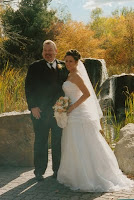Multi-cultural Weddings - Bulgarian and Indonesian

October was the month for multi-cultural ceremonies. First, I planned and coordinated a vow renewal ceremony for a lady from Bulgaria. She and her husband, who is from here, married a year ago in Bulgaria at the registrar's office with her parents and sister, brother-in-law, and niece present. This ceremony was for his family and friends.
While in Bulgaria, the wife had two gowns made, one for the simple ceremony there and a more elaborate one for the Idaho ceremony. The formal gown was very pretty and a bit different from our typical American gowns. It was two-piece, strapless, and laced up the back. The skirt had three deep gathers of fabric from just below the waistline to mid-thigh. The remainder of the skirt was organza with embroidery.
At the end of a Bulgarian ceremony, a mother (in this case the husband's grandmother) breaks a loaf of wedding bread. She then dips small pieces in honey and feeds a piece to the wife and husband to symbolize always having food in their pantry and the sweetness of life. Then, just before the couple exits, the mother (another one of the husband's grandmothers) pours water on the ground in front of them to symbolize a long marriage.
While in Bulgaria, the wife had two gowns made, one for the simple ceremony there and a more elaborate one for the Idaho ceremony. The formal gown was very pretty and a bit different from our typical American gowns. It was two-piece, strapless, and laced up the back. The skirt had three deep gathers of fabric from just below the waistline to mid-thigh. The remainder of the skirt was organza with embroidery.
At the end of a Bulgarian ceremony, a mother (in this case the husband's grandmother) breaks a loaf of wedding bread. She then dips small pieces in honey and feeds a piece to the wife and husband to symbolize always having food in their pantry and the sweetness of life. Then, just before the couple exits, the mother (another one of the husband's grandmothers) pours water on the ground in front of them to symbolize a long marriage.
The following week I planned and coordinated a wedding for an Indonesian couple. Boise boasts a good-sized Indonesian community, most of whom are Christians of Chinese descent. In the Indonesian culture, the colors gold, which represents prosperity, and dark red, which represents happiness, predominate. My bride wanted to add purple, which is her favorite color, but her mother said no.
The ceremony began with the guests singing hymns. Then the bride, groom and wedding party were seated while the pastor, who flew in from Seattle, delivered a homily, followed by the vows and ring exchange. Then the couple presented their parents with a gift of flowers.
The reception was a seated dinner for about 145. Instead of dancing, karoake was available. The couple were also subjected to jokes and tricks, designed to embarass them. A game was played as well. The reception ended with guests having their pictures taken with the couple as they left.
The bride wore a long sleeved high-necked wedding gown. The groom wore a white buttonless tuxedo with a gold vest. Both were rented from shops in Portland, since our local shops don’t carry appropriate clothing. The groom wore full make up, as did the bride. All processionals, entries, exits, were accomplished very slowly and with great pomp and ceremony.
Earlier in the day, the couple performed a traditional Chinese tea ceremony, first for her parents at their hotel, then for his parents at the couple’s home.
When the ceremony was scheduled to begin, only about 10 guests were present and neither set of parents could be found. The groom’s parents finally arrived 30 minutes late. By that time, the ceremony room was quite full, though guests continued to trickle in for about 20 minutes after the ceremony started (50 minutes later than scheduled). As a wedding planner, I found this disrespectful, but apparently it is normal in their culture.
When the ceremony was scheduled to begin, only about 10 guests were present and neither set of parents could be found. The groom’s parents finally arrived 30 minutes late. By that time, the ceremony room was quite full, though guests continued to trickle in for about 20 minutes after the ceremony started (50 minutes later than scheduled). As a wedding planner, I found this disrespectful, but apparently it is normal in their culture.
The couple thoroughly enjoyed their day and I can now add the customs of another culture to my services.



Comments
Post a Comment